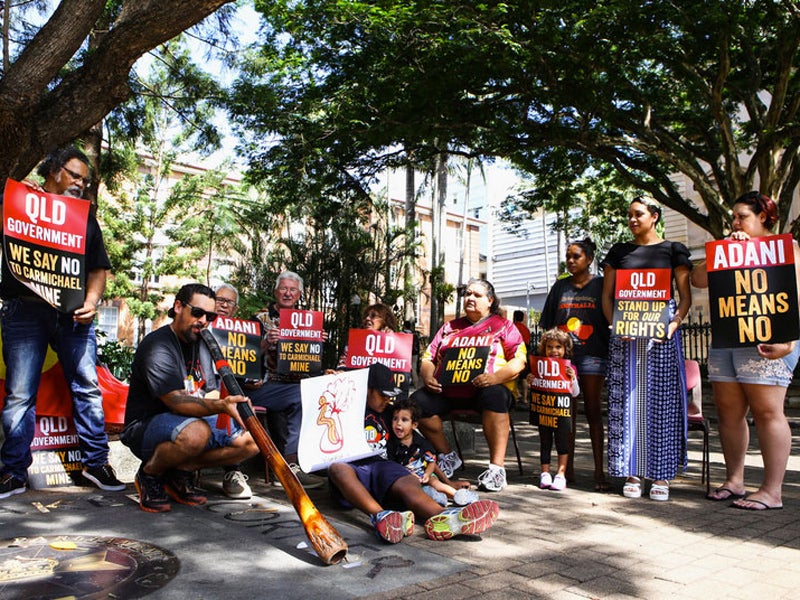Indigenous Australians Take On Massive Coal Mine
Indigenous Australians are taking their fight against one of the largest proposed coal mines in the world to the international community.

This page was published 10 years ago. Find the latest on Earthjustice’s work.
For as long as anyone can remember, the Wangan and Jagalingou people have lived in the flat arid lands of what is now the central western part of the state of Queensland, Australia.
For the Wangan and Jagalingou, their land and waters embody their culture. As their senior spokesperson, Adrian Burragubba, says, “Our land is the starting point of our life. It is where we come from and who we are, and it teaches us how to belong. We are connected to our land and everything on it—our animals, plants and waterholes all have a special place in our culture.”
One of the Wangan and Jagalingou’s most sacred places is the Doongmabulla Springs, where more than 60 individual freshwater springs produce a verdant oasis. These springs are the starting point of life for the Wangan and Jagalingou, as it is from there that the Mundunjudra (also known as the Rainbow Serpent) travelled to form the shape of the land. The path of the Mundunjudra is traced in Wangan and Jagalingou songs, which tell them how to navigate across their lands.
Today, the ancestral homelands of the Wangan and Jagalingou are threatened with destruction by the development of up to six massive coal mines. One of these mines, the Carmichael coal mine, would be among the largest in the world, producing up to 60 million tons of coal per year for up to 60 years if developed as proposed.
The sheer scale of these mines is difficult to conceive, and their development will tear out the heart of the Wangan and Jagalingou’s land. The Carmichael coal mine alone will harm around 30,000 hectares of land, the bulk of which are the Wangan and Jagalingou’s traditional lands. The development will include six open-cut pits and five underground mines, together with associated infrastructure like a coal handling and processing plant, waste dumps and a rail line. The mine will also draw around 12 billion liters of water each year, which will likely dry up and destroy the sacred Doongmabulla Springs and harm the local waxy cabbage palm population—the totem of the Jagalingou people. As Adrian Burragubba says, “If this mine proceeds, it will destroy every connection we have with our customs, laws, and ancestors. Harming the country is harming our sacred beliefs and spiritual connections.”
Under international law, the Wangan and Jagalingou have a right to enjoy their culture and pass it onto future generations. They are deeply concerned that the development of massive coal mines on their traditional lands will irreversibly destroy the lands, waters, plants and animals, including the sacred Doongmabulla Springs. The destruction of their ancestral homelands would harm their culture and identity, violating their internationally-protected human rights.
The Wangan and Jagalingou also have a right under international law to give or withhold their consent to the development of significant extractive activities that would harm their traditional lands, and to be meaningfully consulted in good faith about resource exploitation on those lands. Unfortunately, the government and the developer of the mine, Adani Mining Pty Ltd., continue to pursue the mine’s development despite the Wangan and Jagalingou never consenting to the destruction of their lands and, in fact, twice rejecting an agreement with Adani.
Because the Australian federal government and the Queensland state government have failed to protect the Wangan and Jagalingou’s rights, they have been forced to take their concerns to the international community. On October 2, 2015, the Wangan and Jagalingou alerted the UN Special Rapporteur on the Rights of Indigenous Peoples, the UN Special Rapporteur in the Field of Cultural Rights, and the UN Working Group on the Issue of Human Rights and Transitional Corporations and Other Business Enterprises to the violation of their human rights. The Wangan and Jagalingou requested these UN specialists to investigate and call on Australia to protect their rights.
Earthjustice assisted the Wangan and Jagalingou with preparing the letter to the UN Special Rapporteurs and UN Working Group. You can view the Wangan and Jagalingou’s letter here.
The International Program partners with organizations and communities around the world to establish, strengthen, and enforce national and international legal protections for the environment and public health.